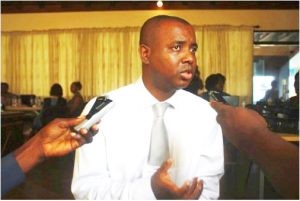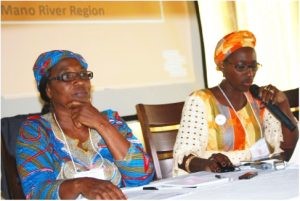This article was published more than 8 years ago.
At the Fund, we know that true equality for women and girls means strong, locally-rooted women’s rights activism that disrupts power structures and cultural norms—some of which are centuries old—that relegate women to second-class status. In every region in which we work, we support talented women and men who are committed to changing this status quo.
We also know that one of the most powerful resources activists have is one other; group convenings allow human rights defenders to build networks, learn new strategies, and celebrate their work. In May 2017, the Fund brought together women’s rights activists in Liberia to share their experiences addressing and preventing violence against women in their communities.
This story, which appeared in the Liberian Observer, shows what can be accomplished when women’s rights activists mobilize and strategize together. The article, titled “MRU Women Brainstorm to Prevent Violence against Women, Girls,” has been republished in its entirety with permission.
About 30 women representing the Mano River Union (MRU) countries of Liberia, Sierra Leone and Guinea have begun brainstorming on how to end violence against women and girls, which include sharing experiences, identifying strategies and forming networks, among others.
The program [officer of the Fund for Global Human Rights] for West Africa, John Kabia, said recent [WHO research that found a third of all women would experience violence at some point in their life], which is worrisome and calls for networks to address such a grave issue in the region and the world at large.

The Fund for Global Human Rights, which organized the event, is a leading supporter of on-the-ground human rights groups around the world.
It offers grants and facilitates technical initiatives to ensure the long-term effectiveness and viability of frontline groups working in challenging conditions with scant resources.
Mr. Kabia made the remarks yesterday at the kickoff of a three day event on the state of Women’s Rights Movements in the Mano River Region, and current programming to respond to violence against women and girls held at a hotel in Congo Town. He said violence is negatively affecting women’s physical, mental, sexual and reproductive health and may increase vulnerability.
The women are representing various organizations in the MRU region including Raising Voices, ActionAid, Women’s Action for Human Dignity (WAHD), Women in Africa (WAFRICA-Guinea), Women and Children Advocacy (WOCAD) and the Centre for Democracy and Human Rights (CDHR), among others.
According to Mr. Kabia, for the past decades, many rights groups have been working to promote access to justice, providing support for victims and finding a way to stop some of the violence against women and girls. “We need to start looking at some of the strategies, methods, processes and principles and we hope that our participants will leave knowing some of the best ways to end violence against women and girls.”
“Liberia is an example of where we have not seen a decrease in violence. Today, there is a movement working on strategies to see how to prevent violence against women and girls rather than just responding after violence has occurred. We need to work on strategies that will prevent violence against women and girls,” he said.
He said the gathering is intended to allow women participants from the various countries to share their experiences, identify strategies on how to prevent violence against women and girls, and to learn from each other and look at some of the research materials that will help prevent violence.
“We want to really build connections in the region to start working with each other in finding resources and some of the work needed to take this fight forward. This is the beginning of the initiative in connecting or having networks to end violence against women and girls,” Mr. Kabia said.
Fatou S. Hann, executive director for Women in Africa (wafrica-Guinea) said there is a need to make available more information on the prevention of violence against women and girls and address the issue of generational [gap]. “There exists a lack of information within the various organizations in Guinea, because they are not passing information to their members.”
Today, she said, “Many organizations don’t have the capacity to advocate for women’s rights. We also need to improve relationships with the government. Women in Guinea are now able to mobilize other women in terms of crisis or other such situations in order to achieve their plan.”

Also speaking, Hannah Yambasu, Women against Violence and Exploitation in Society (WAVES) in Sierra Leone, said the issue of information dissemination especially in the rural communities, remains a serious challenge, stating that many women don’t know what is happening in the city.
“Women’s rights groups or movements have taken sides in the political activities in Sierra Leone instead of being neutral, which is hampering the advocacy process in the country. There is a lack of funding to sustain various organizations. We don’t have a ministry that is defending women and girls’ rights. The educated women have taken the space and left out the rural women,” Madam Yambasu said.
At the convening, activists identified several tools they can leverage to better prevent violence against women. Groups learned about adapting the SASA! Model to their communities, which was pioneered by grantee CEDOVIP and has had remarkable success in Uganda. In addition, activists discussed implementing a gender power framework to prevent reinforcing problematic power dynamics. To help ensure that efforts are sustainable and locally driven, attendees also strategized on best ways to engage deeply rooted community actors within the areas that they work. These tools, as well as the courage and determination of the advocates who attended the convening, give hope to women’s rights activism and the fight to end violence against women and girls.


